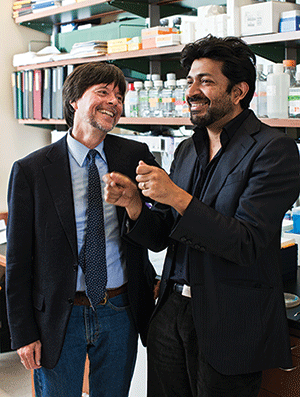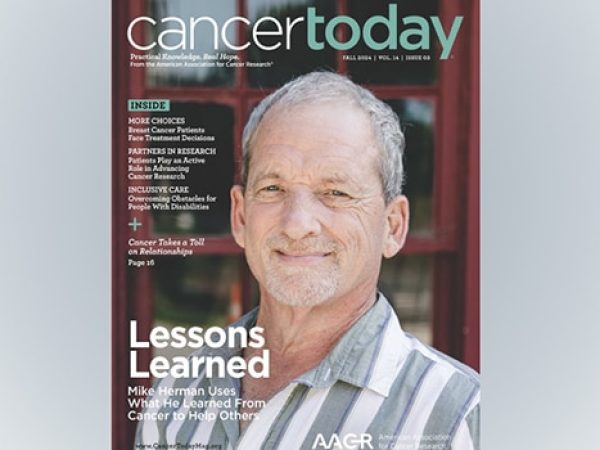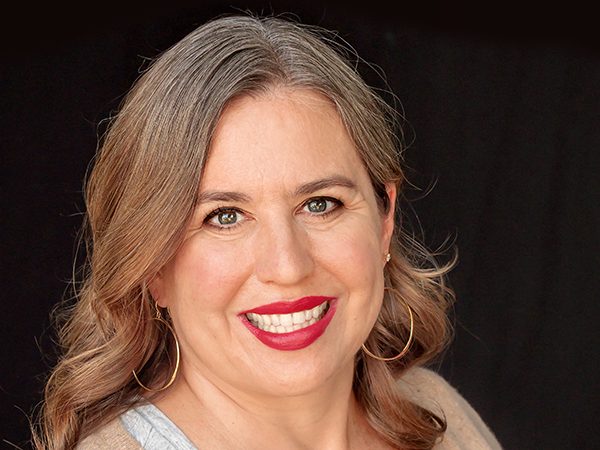Exploring the Past, Present, and Future of Cancer Research

Ken Burns, left, and Siddhartha Mukherjee at Columbia Medical School Cancer Research Lab. Photo by Michael Weschler.
As 2012 drew to a close, it began to look like I might have a shot at the executive editor position at Cancer Today. Responding to the good news, my son, Stephen, gave me a very suitable Christmas gift: a copy of The Emperor of All Maladies: A Biography of Cancer.
At nearly 600 pages, this doorstop of a book served as my primer for learning about cancer history and current developments. The author, Siddhartha Mukherjee, an oncologist and a researcher, wove a complex narrative of cancer’s “biography,” seeking to “enter the mind of this immortal illness, to understand its personality, to demystify its behavior.”
Mukherjee told the stories of cancer activists, researchers, and patients in order to better understand the disease and explain it to others. His painstaking labor, a project he also called “a personal journal of my coming-of-age as an oncologist,” netted his book the 2011 Pulitzer Prize for general nonfiction.
This spring, a six-hour film based on Mukherjee’s book will air on PBS stations. In the winter 2014/2015 issue of Cancer Today, writer Marilyn Fenichel tells the story of how Cancer: The Emperor of All Maladies came to be made, starting with the enthusiasm of two prominent women in the media who had cancer: Sharon Percy Rockefeller, the chief executive officer of WETA, the PBS station in the Washington, D.C., area, and Laura Ziskin, a movie producer and a co-founder of Stand Up To Cancer, which provides funding for promising cancer research. Rockefeller was treated successfully for stage IIIB colorectal cancer; Ziskin died in 2011 of metastatic breast cancer.
The project took off when the pair recruited Ken Burns, who had found fame with his 1990 documentary The Civil War. Burns agreed to serve as executive producer, co-writer, and senior creative consultant, but he asked that another filmmaker produce and direct the documentary. Barak Goodman, a filmmaker whose 2000 documentary Scottsboro: An American Tragedy was nominated for an Oscar, agreed to take on the project.
The fruit of their labor will air on many PBS stations from March 30 to April 1. I encourage you to tune in. Wherever you are in your cancer journey as a researcher, physician, patient, survivor, or caregiver, you’ll be moved and learn a good deal from watching Cancer: The Emperor of All Maladies. And let me recommend that you also read the inspiration for the documentary, Siddhartha Mukherjee’s wonderful book.
The American Association for Cancer Research (AACR), publisher of Cancer Today, is a supporter of Cancer: The Emperor of All Maladies. For more than a century, the AACR’s mission has been to prevent and cure cancer through research, education, communication, and collaboration. Many AACR members were among the pioneers in cancer research, and today more than 33,000 AACR members are on the front lines of the quest for cancer prevention and cures. If you want to support cancer research, please visit the AACR Foundation website to see how you can help.




This message is for Mr. Goodman & Mr. Burns:
The upcoming program on cancer may already be complete, but I’m wondering if it touched on some current cancer research happening at Oregon State University at the Linus Pauling Institute (LPI). Going back to basics, LPI is investigating a plant genus, Fagonia (in Zygophyllaceae), which has been shown to kill two lines of breast cancer cells in vitro. This research stems from the Ayurvedic practice by Pakistani and Indian women of taking a tea made from Fagonia species to treat their breast cancer. Dr. Zabta K. Shinwari, Prof. & Chair, Biotechnical Dept. at Quaid-i-Azam U.(PAK) and Secty. Gen., Pakistan Academy of Sciences, has supplied LPI with authenticated plant material which is being analyzed by Dr. Fred Stevens, Chief Investigator, LPI, for its cytotoxic and antitumor properties. If there is the slightest chance of adding a short piece about such basic, plant research to find treatments for cancer to the upcoming program, I think your audience would find it exciting that some scientists are “going back to go” by researching plants for cancer treatments. Of importance is that, if proved acceptable as a treatment for breast cancer, such treatment will likely be one of the few that are affordable to sufferers in third world countries. As a breast cancer survivor, I welcome such research. Certainly, customized chemotherapy through matching with a patient’s DNA is full of promise, but this approach, like many other treatments, will likely never be available to third-world populations. So, looking again to the world of plants is, I believe, noteworthy and in keeping with the fact that 70% of the world’s medicines today derive from plants.
Thanks for your time and consideration of this suggestion.